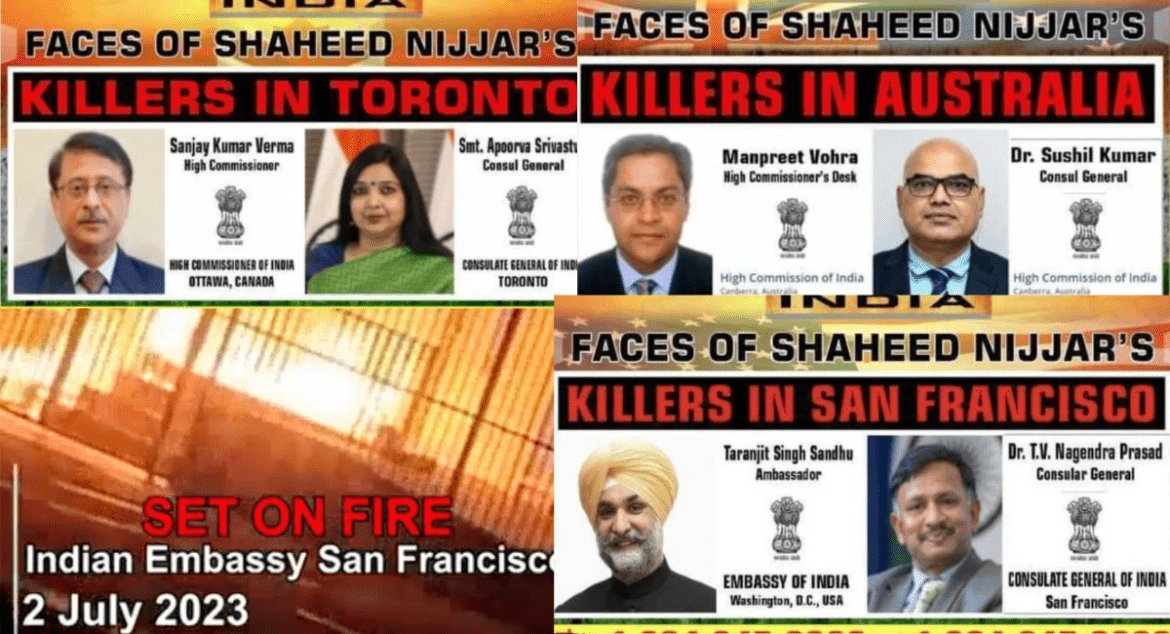AI Generated Summary
- The violent and extremist nature of the Khalistan movement is also a threat to the domestic law and order of the host countries.
- Further exacerbating the situation is the frequency of these attacks, with Tuesday’s incident marking the second act of violence against an Indian mission in a matter of months.
- In a significant departure from the past, where the activities of pro-Khalistan groups were often regarded as freedom of expression, this shift illustrates a new awareness of the threat these factions pose.
The escalating acts of violence carried out by Khalistani extremist factions in countries like the United States, Canada, Australia, the UK, etc., long hidden under the guise of free speech, are now attracting severe scrutiny and condemnation. Often heralded as a beacon of democratic values, these nations are grappling with the flagrant abuse of civil liberties perpetrated in their lands under the pretext of protest.
A recent example is the audacious attempt by Khalistani sympathizers to set the Indian consulate in San Francisco on fire. No longer could these acts be dismissed as mere expressions of dissent; this event starkly highlighted the criminal nature of the activities undertaken by these groups. They had moved beyond the boundaries of peaceful protest and into a territory that unequivocally infringed on the safety and security of others.
It has forced law enforcement agencies, particularly the FBI, to reconsider their stand. The bureau is reportedly planning to enforce criminal laws against such groups and individuals. In a significant departure from the past, where the activities of pro-Khalistan groups were often regarded as freedom of expression, this shift illustrates a new awareness of the threat these factions pose.
Further exacerbating the situation is the frequency of these attacks, with Tuesday’s incident marking the second act of violence against an Indian mission in a matter of months. This escalation has prompted strong condemnation from the US government, which has rightfully labelled it a “criminal offence.”
The Khalistan separatist movement is a dangerous and violent ideology that has no place in the 21st century. In recent months, there have been a number of incidents of violence and intimidation targeting Indian diplomats and institutions in Canada, the United States, and Australia. These incidents are a clear reminder of the threat posed by the Khalistan movement.
In Canada, posters were recently put up targeting Indian diplomats. The posters depicted the diplomats with guns pointed at their heads and warned them to leave the country. In the United States, there was a case of arson at the Indian consulate in San Francisco.
Just yesterday, another poster started circulating on the internet. The poster threatened the High Commissioner of India in Australia, Manpreet Vohra, and the Consulate General of India in Melbourne, Dr Sushil Kumar. The poster called for the two diplomats to be killed and warned that they were “not safe anywhere in the world.”
These incidents are a clear sign that the Khalistan movement, which always has been violent, is now becoming increasingly aggressive. The movement is trying to incite communal violence in countries like Canada, the US, the UK, Australia, etc. This is a dangerous and unacceptable trend.
The violent and extremist nature of the Khalistan movement is also a threat to the domestic law and order of the host countries. In 1985, the Air India Flight 182 was bombed by Khalistani extremists, killing 329 people, including 280 Canadian citizens. This was the deadliest terrorist attack in Canadian history. If countries like Canada, Australia and other keep encouraging these elements for mere vote-bank politics, they are comprising their own national security, and another devastating attack could just be around the corner.
The Khalistan movement is based on the false and dangerous idea that Sikhs are a separate nation from India. This idea is not supported by history or reality. We have been an integral part of India’s cultural fabric, and have made significant contributions to Indian society and culture. It is noteworthy that today, all of India takes immense pride in acknowledging that “an Indian is leading the World Bank.” Ajay Banga, the son of an Indian army officer and of Sikh heritage, is that example.
The Khalistan movement is a threat to peace and security in India and the wider world. It won’t be wrong to say these elements create more of an issue for the host countries, than they do for India. Khalistani extremists are a threat to the safety and security of all people, regardless of their religion or nationality. It is important to stand up to this movement and to condemn its violent and extremist ideology. We must work together to ensure that the Khalistan movement does not succeed in its goal of dividing India.
In addition to the violence and intimidation, the Khalistan movement is also trying to spread its separatist ideology through propaganda and misinformation. The movement today is active primarily on social media, where it has been spreading false information about India and the Sikh community. This is a dangerous trend, as it can lead to increased tensions and violence.
It is important to be aware of the Khalistan movement and its ideology. We must be careful not to spread the movement’s propaganda or to give it any legitimacy. We must also stand up to the movement’s violence and intimidation. Together, we can help to defeat the Khalistan movement and to protect the peace and security of India and the wider world.




